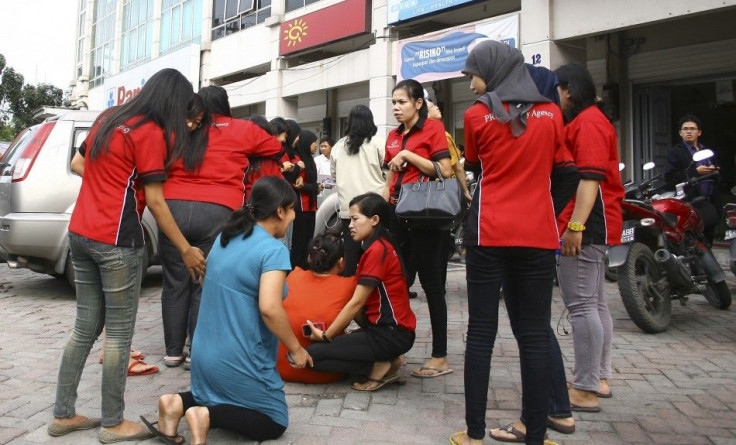2 Quakes Hit Indonesia's Coast; Tsunami Watch Canceled

Seismologists on Wednesday canceled their warning of a possible tsunami following an 8.2-magnitude earthquake that struck of the coast of Indonesia's Sumatra island.
Sea level readings now indicate that the threat has diminished for most areas, therefore the tsunami watch issued by this center is now canceled, the Hawaii-based U.S. Pacific Tsunami Warning Center said, based on its monitoring of Indian Ocean currents following the second of two major quakes Wednesday to hit coastal Indonesia.
The Hawaii center's announcement at 1236 GMT folllowed the magnitude-8.2 temblor, which itself came two hours and 15 minutes after a stronger -- 8.7-magnitude -- quake had triggered tsunami alerts across the region.
The U.S. Geological Survey said the aftershock struck at 4:43 p.m. local time (1043 GMT), 618 kilometers (384 miles) from Banda Aceh, the capital of Sumatra's Aceh province. The quake's epicenter was 16 kilometers (10 miles) beneath the ocean.
Earlier, officials had issued a tsunami alert for Southeast Asian countries and had urged people to move to safety away from coastlines after the initial, magnitude-8.6 temblor struck off Sumatra. Indonesian seismological authorities had put the magnitude at 8.7.
The first, 8.6-magnitude quake off Aceh province two hours earlier spawned a wave around 80 centimeters (30 inches) high but caused no serious damage, authorities said.
Harjadi, a local official who goes by only one name, said the new tsunami warning was for residents living along the western coast of Indonesia. The warning included Sumatra as well as the Mentawai islands.
News reports cited seismologists as saying Wednesday's quakes were far smaller than either of the deadly tsunamis that struck the Indian Ocean area in December 2004 and Japan in March 2011.
Still, the region-wide warnings caused streets to clog with traffic as residents fled to high ground in cars and on the backs of motorcycles, the Associated Press reported.
In the hours after the quake hit, however, there was no sign of the feared wave. Damage to structures also appeared to be minimal.
The USGS said the 8.6-magnitude quake struck at 2:38 p.m. local time (0838 GMT) was centered 33 kilometers (20 miles) beneath the ocean floor, about 434 kilometers (269 miles) from Aceh province.
It wasn't the strongest quake I've felt, the AP quoted 22-year-old Tuti Rahmi as saying as she tried to reach her brother by phone from Banda Aceh. People around her were crying and screaming as they poured from their homes.
But it seemed to last forever, Rahmi said, adding the ground shook for nearly four minutes.
The Pacific Tsunami Warning Center's tsunami watch had been in effect for Indonesia, India, Sri Lanka, Australia, Myanmar, Thailand, the Maldives and other Indian Ocean islands, Malaysia, Pakistan, Somalia, Oman, Iran, Bangladesh, Kenya, South Africa and Singapore.
Roger Musson, a British seismologist who has studied Sumatra's fault lines, told the AP the second temblor was a strike-slip quake, not a thrust quake. In a strike slip quake, the earth moves horizontally rather than vertically and doesn't displace large volumes of water.
The tremor was felt in Malaysia, where it caused high-rise buildings to shake for about a minute, and in Singapore, Thailand, Bangladesh and India.
There was chaos in the streets of Aceh, where memories of the 2004 tsunami that killed 170,000 people in the province alone, remain raw.
Patients poured out of hospitals, some with drips still attached to their arms. In some places, electricity was briefly cut. Hours after the temblor, people were still standing outside their homes and offices, afraid to go back inside.
In Thailand, the National Disaster Warning Center ordered residents in six provinces along the country's west coast to evacuate. These included the popular tourist destinations of Phuket, Krabi and Phang-Nga.
India's Tsunami Warning Center issued a warning for parts of the eastern Andaman and Nicobar islands. In Tamil Nadu, southern India, police cordoned off the beach and used loudspeakers to warn people to leave the area.
© Copyright IBTimes 2025. All rights reserved.






















